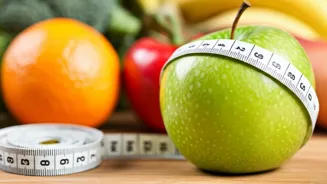Prioritize Protein Intake
Protein is an essential nutrient, and its consumption plays a key role in fat loss. Make a conscious effort to include protein in every meal, ensuring
it forms a substantial part of your diet. Protein helps you feel full, which can significantly reduce your overall calorie intake by preventing overeating. Moreover, protein helps to preserve muscle mass during weight loss, leading to a more toned physique. Excellent sources of protein include lean meats, fish, eggs, dairy products, and plant-based options such as beans, lentils, and tofu. Aim to include protein in every meal and snack to maximize its fat-burning benefits.
Hydration Is Key
Drinking sufficient water is frequently underestimated in its importance for weight loss. Water helps boost your metabolism, aids digestion, and can make you feel fuller, reducing the chances of unnecessary snacking. Dehydration can sometimes be mistaken for hunger, leading to overeating. Aim to drink at least eight glasses of water throughout the day. Consider carrying a water bottle with you to stay hydrated. You can also incorporate other hydrating fluids like herbal teas and water-rich fruits and vegetables, such as cucumber and watermelon, to meet your daily fluid needs. This simple habit can have a major impact on your progress.
Embrace Fiber-Rich Foods
Fiber, a type of carbohydrate that your body doesn't digest, is a crucial component for losing belly fat. Fiber adds bulk to your meals, promoting feelings of fullness and reducing the urge to overeat. Fiber also helps regulate blood sugar levels, which can prevent fat storage. Incorporate high-fiber foods into your diet, such as whole grains (oats, quinoa, brown rice), fruits, vegetables (broccoli, spinach, berries), and legumes (beans, lentils). Aim to get at least 25-30 grams of fiber each day. Consider adding a fiber supplement to your diet if you find it difficult to consume enough through food alone, but remember to increase your fluid intake when increasing fiber intake.
Mindful Eating Practices
Mindful eating is about paying attention to your food and eating habits. This means eating slowly, savoring each bite, and being aware of your body's hunger and fullness cues. Practicing mindful eating helps to prevent overeating and promotes better digestion. Before you eat, ask yourself how hungry you feel. During your meal, put your fork down between bites, and focus on the taste and texture of your food. Stop eating when you feel satisfied, not stuffed. Avoid distractions like watching television or scrolling through your phone while eating, as these can lead to mindless overeating. By practicing mindful eating, you develop a healthier relationship with food and learn to control your portions effectively.
Reduce Processed Foods
Processed foods are often high in added sugars, unhealthy fats, and calories, all of which can contribute to belly fat. These foods are also typically low in essential nutrients, leaving you feeling hungry and unsatisfied. Reduce or eliminate processed foods such as packaged snacks, sugary drinks, fast food, and refined carbohydrates. Instead, focus on whole, unprocessed foods like fruits, vegetables, lean proteins, and whole grains. Cooking meals at home allows you to control the ingredients and portion sizes, making it easier to make healthier choices. Reading food labels carefully helps you to identify and avoid hidden sugars and unhealthy fats.
Prioritize Quality Sleep
Getting enough sleep is essential for overall health and weight management. When you don't get enough sleep, your body produces more of the hunger hormone, ghrelin, and less of the fullness hormone, leptin, which can lead to increased appetite and cravings. Lack of sleep can also disrupt your metabolism and make it harder to burn calories. Aim for 7-9 hours of quality sleep per night. Establish a regular sleep schedule, going to bed and waking up at the same time each day, even on weekends. Create a relaxing bedtime routine, such as taking a warm bath, reading a book, or listening to calming music. Ensure your bedroom is dark, quiet, and cool to promote better sleep. Avoid caffeine and alcohol close to bedtime, as they can interfere with your sleep cycle.
Incorporate Light Exercise
While this article focuses on daily habits without intense workouts, light exercise can still significantly help to burn calories and reduce belly fat. Regular physical activity helps to improve your metabolism and increase fat burning. Engage in activities you enjoy, such as walking, jogging, swimming, or cycling. Aim for at least 30 minutes of moderate-intensity exercise most days of the week. You can also incorporate simple exercises into your daily routine, such as taking the stairs instead of the elevator, walking during your lunch break, or doing some light stretching or yoga at home. Even small amounts of daily movement can contribute to your overall fat loss goals.

















